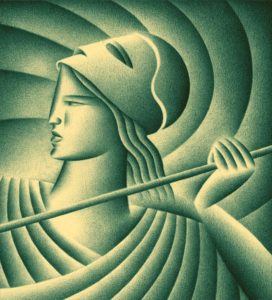
Athena, or Pallas Athena as she is sometimes called, is the preeminent Olympian patroness of civilised life, warfare and the metalworking of weaponry, agriculture, as well as moral virtues such as justice, balance, orderliness and wisdom (what the ancient Egyptians called maat). She was also an avid defender and corroborator of the reputed Greek heroes Perseus, Heracles, Jason and Odysseus. The latter of these was her personal favourite, her best beloved.
According to the classical myths, Athena was the progeny of Zeus alone. She was his blood and seed, made in his image alone; perhaps this is why she was also his favourite child. In one of the most commonly cited interpretations of her birth, Zeus embarks on a furious affair with Metis, a daughter of the mighty Titans, oblivious to an oracular prophecy declaring that any children sired by the latter would carry a supernatural and omnipotent fervour more potent than their sire. Realising his mistake, Zeus swallows Metis in hope that any impending conception would die with her. But this was not the case. Shortly afterwards, he experiences an intense and debilitating headache akin to a migraine, and to relieve him of his suffering a horde of fellow Olympians cleave his head open with a labrys, a Minoan axe. The violent blow liberates an ululating Pallas Athena, who springs forth from atop his head bedecked in a full suite of armour.
Foremost of her epithets is “grey-eyed” or “flashing-eyed”, most fitting because of the inexplicable, qualitative connection between the colour grey and the concept of divine wisdom over which she presides. She was also called “Parthenos,” a word which denotes maiden or virgin in Greek, and sheds ample light upon the decision to name her principle temple of worship on the Acropolis “The Parthenon”. In fact, the virgin goddess was a lot more than just the principle deity worshipped at Athenian Acropolis; she was the sole patron of the entire city. In a renowned local legend, we learn that in a time before this, a frantic quarrel unravelled between Athena and Poseidon concerning sovereignty over the beautiful city. The unanimous verdict amongst the Olympians, the city’s residents and the contestants themselves was that patronage would be granted to the conferrer of the best gift. Hoping to woo the masses with his sheer strength, Poseidon generated a pressurised salt spring atop the Acropolis by striking the bare ground with his trident. Athena, on the other hand, was much craftier and subtle in her offering. She jabbed her foot against the earth, and the first domesticated olive tree sprung from the dirt. The first gift was impressive but useless, seeing that salt water was undrinkable; the second appeared much more modest, albeit it hid a triune potential–wood, oil, and olives–all of which were useful. Wood could be used in the construction of living quarters, oil and olives consumed. For these reasons, the victory was awarded to Athena.
In Homer’s Iliad, Athena takes the side of the Achaeans, the Greeks. To understand why all we need to do is look at the Judgement of Paris, the prologue to the Trojan War. The Olympian gods and goddesses were not ones to take knockbacks lightly, especially when they were of a personal nature. In the same way Paris’s act of gifting the golden apple to Aphrodite enraged Athena to the point that she never quite forgot it. Hence, when the agglomeration of events that followed Aphrodite’s acquisition of the golden apple flowered into a full-fledged war, Athena fought vehemently and furiously against Paris and his people, the Trojans. Athena’s intervention in this nine-year war was pivotal, for it instilled the Greek forces led by Agamemnon of Mycenae with the requisite cunning to finally breach the formidable walls of the city and slaughter the inhabitants. Indeed, the conspiracy to bring down the city by constructing a hollow wooden horse and presenting it to the Trojans under the pretence of a gift was exclusively her idea. In the end the horse wasn’t a gift at all, but rather a ticking time-bomb nursing a horde of dormant Greek soldiers who would emerge after nightfall and assail the Trojans unawares.
In the sphere of created Nature, the olive tree, as well as the owl, the serpent and the horse were all sacred to her. Her Latin equivalent is Minerva.








